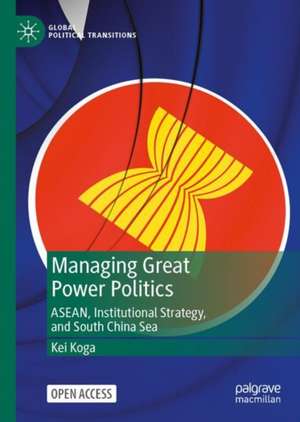Managing Great Power Politics: ASEAN, Institutional Strategy, and the South China Sea: Global Political Transitions
Autor Kei Kogaen Limba Engleză Paperback – sep 2022
| Toate formatele și edițiile | Preț | Express |
|---|---|---|
| Paperback (1) | 280.91 lei 3-5 săpt. | +21.37 lei 4-10 zile |
| Springer Nature Singapore – sep 2022 | 280.91 lei 3-5 săpt. | +21.37 lei 4-10 zile |
| Hardback (1) | 349.78 lei 3-5 săpt. | +25.12 lei 4-10 zile |
| Springer Nature Singapore – sep 2022 | 349.78 lei 3-5 săpt. | +25.12 lei 4-10 zile |
Preț: 280.91 lei
Nou
Puncte Express: 421
Preț estimativ în valută:
53.76€ • 58.37$ • 45.16£
53.76€ • 58.37$ • 45.16£
Carte disponibilă
Livrare economică 01-15 aprilie
Livrare express 15-21 martie pentru 31.36 lei
Preluare comenzi: 021 569.72.76
Specificații
ISBN-13: 9789811926136
ISBN-10: 9811926131
Pagini: 284
Ilustrații: XIX, 284 p. 7 illus., 6 illus. in color.
Dimensiuni: 148 x 210 x 25 mm
Greutate: 0.37 kg
Ediția:1st ed. 2022
Editura: Springer Nature Singapore
Colecția Palgrave Macmillan
Seria Global Political Transitions
Locul publicării:Singapore, Singapore
ISBN-10: 9811926131
Pagini: 284
Ilustrații: XIX, 284 p. 7 illus., 6 illus. in color.
Dimensiuni: 148 x 210 x 25 mm
Greutate: 0.37 kg
Ediția:1st ed. 2022
Editura: Springer Nature Singapore
Colecția Palgrave Macmillan
Seria Global Political Transitions
Locul publicării:Singapore, Singapore
Cuprins
Chapter 1: Introduction—ASEAN’s Strategic Utility Redefined.- Chapter 2: The Concept of Institutional Strategy and Change.- Chapter 3: Four Phases of South China Sea Disputes 1990–2020.- Chapter 4: Institutional Strategies of ASEAN/ASEAN-led Institutions.- Chapter 5: Conclusion—Future Implications of ASEAN’s Institutional Strategies.
Recenzii
“Managing Great Power Politics: ASEAN, Institutional Strategy, and the South China Sea is a useful reminder that one can find power in weakness, as well as strategy. … Koga’s book is a careful, empirically rich, nuanced overview of ASEAN’s long-standing, thankless efforts to preserve relative stability in the South China Sea.” (Stéphanie Martel, Pacific Affairs, Vol. 96 (3), September, 2023)
Notă biografică
Kei Koga is Assistant Professor at the Public Policy and Global Affairs Programme, School of Social Sciences, Nanyang Technological University (NTU), Singapore. His research focuses on International Security, International Institutions, and East Asian/Indo-Pacific security.
Textul de pe ultima copertă
This Open Access book explains ASEAN’s strategic role in managing great power politics in East Asia. Constructing a theory of institutional strategy, this book argues that the regional security institutions in Southeast Asia, ASEAN and ASEAN-led institutions have devised their own institutional strategies vis-à-vis the South China Sea and navigated the great-power politics since the 1990s. ASEAN proliferated new security institutions in the 1990s and 2000s that assumed a different functionality, a different geopolitical scope, and thus a different institutional strategy. In so doing, ASEAN formed a “strategic institutional web” that nurtured a quasi-division of labor among the institutions to maintain relative stability in the South China Sea. Unlike the conventional analysis on ASEAN, this study disaggregates “ASEAN” as a collective regional actor into specific individual institutions—ASEAN Foreign Ministers’ Meeting, ASEAN Summit, ASEAN-China dialogues, ASEAN Regional Forum, East Asia Summit, and ASEAN Defense Ministers Meeting and ASEAN Defense Ministers Meeting-Plus—and explains how each of these institutions has devised and/or shifted its institutional strategy to curb great powers’ ambition in dominating the South China Sea while navigating great power competition. The book sheds light on the strategic potential and limitations of ASEAN and ASEAN-led security institutions, offers implications for the future role of ASEAN in the Indo-Pacific region, and provides an alternative understanding of the strategic utilities of regional security institutions.
Caracteristici
Elaborates on secondary powers’ strategy to tame great power politics Re-Discovers the strategic utility of secondary power’s regional institutions Highlights the ASEAN model of institutional division of labor This book is open access, which means that you have free and unlimited access














